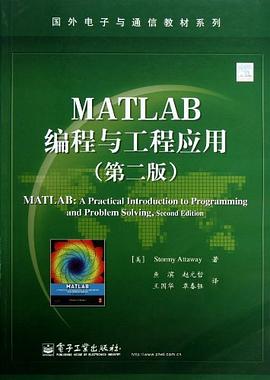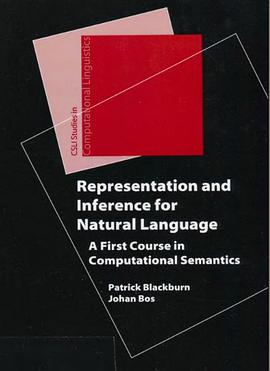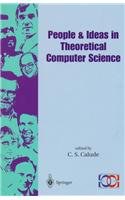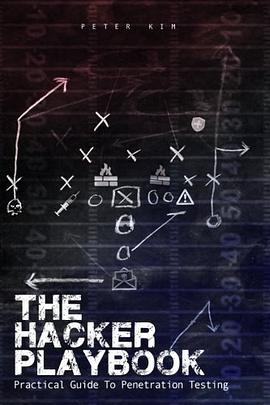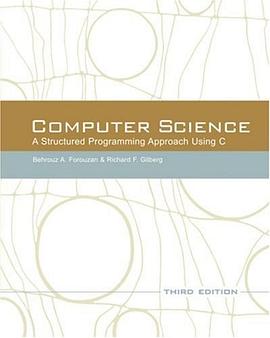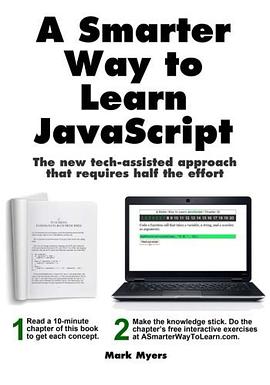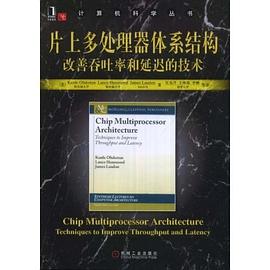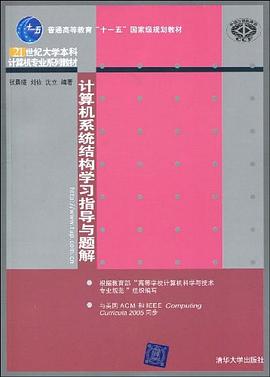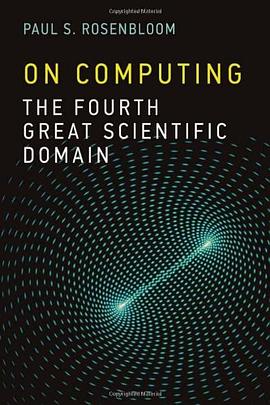

具体描述
Computing isn't simply about hardware or software, or calculation or applications. Computing, writes Paul Rosenbloom, is an exciting and diverse, yet remarkably coherent, scientific enterprise that is highly multidisciplinary yet maintains a unique core of its own. In On Computing, Rosenbloom proposes that computing is a great scientific domain on a par with the physical, life, and social sciences. Rosenbloom introduces a relational approach for understanding computing, conceptualizing it in terms of forms of interaction and implementation, to reveal the hidden structures and connections among its disciplines. He argues for the continuing vitality of computing, surveying the leading edge in computing's combination with other domains, from biocomputing and brain-computer interfaces to crowdsourcing and virtual humans to robots and the intermingling of the real and the virtual. He explores forms of higher order coherence, or macrostructures, over complex computing topics and organizations, such as computing's role in the pursuit of science and the structure of academic computing. Finally, he examines the very notion of a great scientific domain in philosophical terms, honing his argument that computing should be considered the fourth great scientific domain. Rosenbloom's proposal may prove to be controversial, but the intent is to initiate a long overdue conversation about the nature and future of a field in search of its soul. Rosenbloom, a key architect of the founding of University of Southern California's Institute for Creative Technologies and former Deputy Director of USC's Information Sciences Institute, offers a broader perspective on what computing is and what it can become.
作者简介
目录信息
读后感
评分
评分
评分
评分
用户评价
我购入《On Computing》的动机是希望了解计算范式在哲学层面的演变,尤其是与认知科学的交叉点。我期待能读到一些关于“信息熵”和“意识涌现”之间微妙关联的探讨,或许能从计算的视角理解人类心智的运作。然而,这本书在这方面的处理简直是蜻蜓点水,甚至可以说是敷衍了事。当它触及到与伦理、哲学相关的议题时,叙述的严谨性便迅速瓦解了。作者仿佛在疲于应付这些“软科学”的议题,给出的论断缺乏严肃的论据支撑,更多是基于一种直觉式的推测。例如,关于强人工智能的讨论,完全没有提及近年来基于大型语言模型的最新进展及其带来的挑战,只是重复了上个世纪的经典哲学悖论,这让这本书的“当代性”大打折扣。如果一本谈论“计算”的书,不能有效连接理论基础与当代技术哲学讨论的前沿,那么它的价值就仅仅停留在对历史的回顾上,而失去了对未来的指导意义。这本书在试图成为“跨学科巨著”的野心和实际的学术深度之间,失衡得厉害。
评分我希望这本书能成为一本引导者,帮助我梳理和理解当前计算领域快速迭代带来的迷雾。我期待的是一种清晰的、基于原理的、面向未来的视野。然而,《On Computing》更像是一部“考古发掘报告”,里面充满了对遥远历史的精细描绘,却对近在眼前的技术变革视而不见。它过多地沉浸在对冯·诺依曼结构的缅怀和对早期计算理论的反复咀嚼中,以至于错失了对云计算的弹性、边缘计算的去中心化以及生成式模型的颠覆性力量的有效整合。阅读过程更像是一场与时代脱节的对话,我仿佛被强行拉回到了信息时代的黎明时期,去重温那些已经成为基础知识的内容,而不是探索那些尚未完全成型的、更令人兴奋的前沿领域。这本书在“计算”的广度上有所涉猎,但绝对深度不足,更重要的是,它完全缺乏那种驱动读者向前探索的、与未来科技脉搏同步的活力。这是一部停留在过去的作品,而非指向未来的指南。
评分拿到这本《On Computing》时,我原本抱着极大的期待,毕竟“计算”这个主题本身就蕴含着无限的可能性与深度。然而,阅读完之后,我的心情却如同经历了一场期待落空的海上航行。这本书的结构松散得令人发指,仿佛是作者在不同时期的随笔、讲稿和未完成的研究笔记的简单堆砌。它试图涵盖从图灵机理论到量子计算的宏大叙事,却在每一个关键的转折点都显得力不从心。例如,在讨论现代并行处理架构时,作者似乎对多核系统的缓存一致性问题采取了一种回避的态度,只是泛泛而谈“提高数据吞吐量”这类口号式的陈述,完全没有深入到实践工程师所关心的具体瓶颈。更令人沮丧的是,书中引用的案例常常显得过时或者过于学术化,与当前蓬勃发展的AI应用和云计算基础设施几乎毫无关联。我花了大量时间试图在这些看似庞杂的信息中梳理出一条清晰的脉络,希望能找到作者试图建立的“计算本质”的论点,但最终只捕获到一些零碎的、相互矛盾的观点。这本书更像是一份为初学者准备的、但又缺乏系统性的知识清单,对于任何有一定计算机科学背景的读者来说,它提供的增量价值微乎其微,实在难以称得上是一部深入的“计算学”著作。
评分从排版和编辑质量来看,这本书的制作水准也令人遗憾。纸张的质感平平无奇,装帧设计更是保守得像二十年前的学术专著,毫无现代出版物的审美可言。更重要的是,书中错误百出的图表和参考书目混乱,简直是对读者耐心的终极考验。我数次在跟进一个复杂的流程图时,发现标注的字母与正文的描述前后矛盾,不得不暂停阅读去猜测作者的本意。这已经超出了“小疏忽”的范畴,直指出版流程的粗糙。对于一本宣称是权威参考的书籍,这种低级的错误是不应该出现的。它给人的感觉是,作者写完初稿后,没有经过任何严格的同行评审或专业校对,就仓促地付梓印刷了。这种不专业的态度,极大地影响了我对其中理论内容可信度的判断。我无法完全信任一个连细节都处理不好的人所阐述的宏大计算理论,因为计算的严谨性正是其安身立命之本。
评分这本书的语言风格,用一个词来形容,就是“冗余的晦涩”。作者似乎迷恋于使用那些极其复杂的句式和生僻的术语,这使得原本清晰的概念被包裹在厚厚的学术烟雾之中。我不得不反复查阅大量的参考资料,才能真正理解作者试图表达的那个核心思想——如果那个思想真的存在的话。举个例子,在阐述算法复杂度的章节,作者花费了近二十页的篇幅来铺陈数学推导,但最终得出的结论却是教科书上随处可见的标准结论,没有提供任何新的洞见或者对现有证明的简化。这让人不禁怀疑,作者的目的究竟是为了阐明知识,还是仅仅为了展示其对特定数学工具的熟练掌握?读起来就像是在啃一块布满了复杂纹理但味道寡淡的石头。对于那些希望通过阅读此书来快速把握某个计算前沿领域精髓的读者来说,这无疑是一种折磨。它没有提供那种“豁然开朗”的阅读体验,相反,它制造了大量的认知阻力,仿佛作者在刻意设置障碍,将读者拒之门外。我希望读到的是对复杂问题的优雅解答,而不是对问题的复杂性本身进行不必要的艺术化渲染。
评分 评分 评分 评分 评分相关图书
本站所有内容均为互联网搜索引擎提供的公开搜索信息,本站不存储任何数据与内容,任何内容与数据均与本站无关,如有需要请联系相关搜索引擎包括但不限于百度,google,bing,sogou 等
© 2026 book.quotespace.org All Rights Reserved. 小美书屋 版权所有




